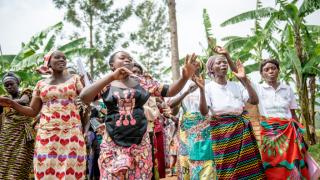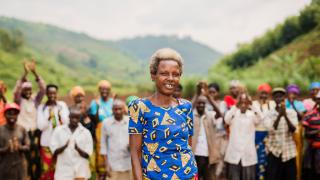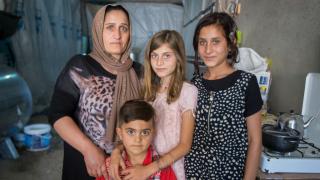Reflecting on peace: from Sierra Leone to South London
This International Day of Peace, Sylvia Kamara, our Fundraising Projects Asssistant, shares why peace is something we can all work towards.
Twenty-seven years ago, my home country, Sierra Leone, was ripped apart by years of brutality. Thousands of women and girls raped, tens of thousands of civilians’ limbs amputated and over 50,000 killed. Twenty-seven years later the scars of war still live with us.
I see it in the panic within the Sierra Leonean community whenever there is an election, and everyone starts to pray for peace. Or when I go back home to Sierra Leone and see the land where my grandma's home once stood, along with many other homes that haven’t been rebuilt after the war. These scars manifest in the stories told by my mum.
I was born during the civil war in Sierra Leone – the relentless shooting and fight for survival was part of my life. It was once my reality. But, I do not remember much about what it was like growing up in that environment. The trauma of living through violence means my mind has erased some of those memories.
What I do remember are the panic attacks whenever the relentless shooting would start, I recall how my mum would wrap her arms around my shoulders and try to shake me back to life. It was not a time to be crippled by fear… it was time to run.
Four years after the war, my mum and I moved to London – an opportunity for me, at 10 years old, to grow up in a country where there is peace. I remember the first time I ever witnessed fireworks in London and how the sound reminded me of the shooting – in my mind I was back in Sierra Leone.
She would tell me horrific stories of how rebels used to gamble on the sex of a baby and then cut the baby out of their mother’s belly to find out.
As I get older, I try to remember the war through my mum’s experience. Every chance I get I ask her what it was like for her to flee for her life and lose everything. She told me the most scared she ever felt was when she was pregnant with me.
She feared being captured because she knew what the fate of her and her baby would be. She would tell me horrific stories of how rebels used to gamble on the sex of a baby and then cut the baby out of their mother’s belly to find out.
To me, this was just a story, a story I could never wrap my head around and one that thankfully never happened. This was until I started working at Women for Women International and learned that it was a reality for some of the women we work with, women like Fatuma, who was raped, had her pregnant belly cut open with a machete and her baby killed.
Can you imagine such horror? The vast majority of war casualties are women and children – women like Fatuma.
I've lived in London for over 11 years; it is my second home. I met my best friend here – my ride or die as I like to call her – and connected with many wonderful people.
When women don't feel safe to walk alone at night for fear of being attacked or wear a dress they love because it brings too much unwanted attention, have we really achieved peace?
This International Day of Peace, I wanted to reflect on what peace means to me, not just for Sierra Leone and other countries affected by conflict but also here, in what is now my home. Have we really achieved peace, especially for women?
One thing the #MeToo movement has highlighted is that sexual harassment and sexual assault is something many women in London face on a daily basis.
When women don't feel safe to walk alone at night for fear of being attacked or can't wear a dress they love because it brings too much unwanted attention, have we really achieved peace? When our society continues to blame women for what they were wearing, for staying out too late, or having one too many drinks so that they can justify sexual harassment and assault, have we really achieved peace?

Peace for me is seeing thousands of women come together to form movements like #MeToo telling the world, 'no more will we be silenced'. It’s raising awareness of rape culture so that my best friend can walk home at night without fear of being attacked.
Though these scars of war remain within my community, it is a reminder of where we never want to be again.
Women for Women International is giving women like Fatuma hope and a platform to share their stories. This work is a vital step towards achieving peace for women around the world.
I find peace in seeing my mum happy and the work she does to give back to our people in Sierra Leone or seeing what many other Sierra Leoneans are doing to contribute towards rebuilding our country for the future generation.
It has been sixteen years since the war ended in Sierra Leone, and I still carry it with me. It is fuel for my passion for the work I do serving women survivors of war. It motivates my activism for equality and respect for women. Though these scars of war remain within my community, it is a reminder of where we never want to be again, and it inspires our fight for peace.
Continue Reading
Celebrating Graduation Day in the DRC
subtitle:
600 of our programme participants in the DRC have graduated from our 12-month social and economic empowerment programme. It was a chance for our programme graduates to reflect on their journey and share their achievements with their classmates, families and wider communities.
Humanitarianism: A Daily Workout
subtitle:
This World Humanitarian Day, we are reminded of our shared responsibility to support those caught up in global crises. Find out three ways you can exercise your humanitarianism from our Executive Director, Brita Fernandez Schmidt.
The Sinjar Massacre: Four Years On
subtitle:
Our Director of Fundraising, Marketing and Communications, Shivonne Graham reflects on the Sinjar massacre and our work in response to the crisis.




